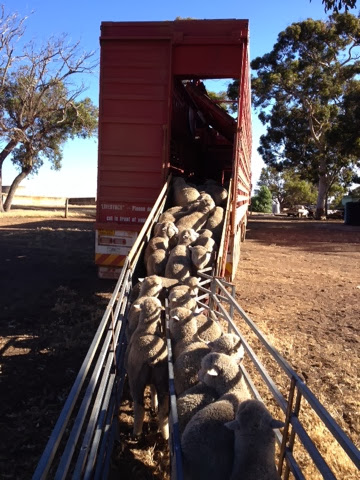What does one need to be prepared in summer time on a farm in the south west of WA?
The first thing I do when I walk out the door in the morning is make sure I, personally, have everything I need. A hat for that harsh sun, sunglasses to stop the glare and to protect the eyes when riding a motorbike or fencing. Sunscreen, because getting seriously burnt is not a pleasant or healthy experience. Some days I need jeans, particularly the days I'm working in canola stubble. I need sock protectors every day, picking grass seeds out of your socks throughout the day is annoying, painful and time consuming. And of course, your boots of preferred brand and a work shirt. I make sure I have my phone with me at all times as the UHF radio doesn't reach from one block of land to the other, on the other hand I make sure I have the UHF radio as mobile reception is pretty patchy. I take a water bottle with me wherever I go, it's not as hot as the Pilbara but it's still warm enough to dehydrate your body. I always have a pair of gloves on hand and for those solo jobs I keep my headphones handy (following a slow mob of sheep up a laneway is rather boring without some good tunes).
So now I'm protected and prepared for the day, which vehicle do I get in? Well, it could be anything; the work ute, the two wheel motorbike, the four wheel motorbike, the little tractor, the big tractor, the harvester, or any number of machines older than I am. I could even be on foot. If it's a motorbike I wear a helmet and I take my phone or a handheld UHF radio. The tractors and the harvesters are relatively self sufficient, however, we do legally have to have a fire unit in the paddock we are harvesting in. Which brings us to the work ute, this is the trusty steed that will go almost anywhere and carries everything we need to achieve any job that crops up.
It holds (and I may have missed some things):
A fire unit consisting of a 1000 litre tank and a fire pump, imagine finding a fire and having no way to put it out...
Petrol for the fire pump.
Fire lighter (a mix of petrol and diesel) and a fire bug in case we have to attend a fire and need to back burn for safety. Matches, a 4 litre water bottle, the fire rake, a shovel.
Behind the seat we have smoke goggles, fire overalls, and a first aid kit.
The chainsaw with premixed fuel and bar oil plus sharpening gear, earmuffs and safety glasses.
The tool box which holds any tool we could need plus a few more.
Hard wire for fencing, soft wire for twitching, fencing pliers, strainers and steel pickets (posts) plus the dolly required to bang them in
A heavy duty chain, rope, and ratchet straps.
Fly treatment, a knife, and almost always a 22 (rifle).
UHF and VHF radios. The local volunteer brushfire brigade runs off VHF, a work phone and it's car kit which provides better reception.
So, now you know what we carry with us at all times. On top of that, every time we get in it we make sure it's got at least half a tank of diesel. Rocking up to a fire and getting stranded with no fuel is not a good look, let alone a good feeling. Every time it's fuelled we check under the bonnet for oil, coolant, and power steering fluid levels and we check the tyre pressures. Given we don't know exactly what will arise each day it's best to be prepared. With all of this gear I could potentially check the back paddock and the sheep in it. Let's say there's a fly blown sheep, I can treat it or put it down if it's too far gone. Maybe there's a tree on the fence. I can cut it off the fence, tow it away and strain it to keep the sheep in. If a fire started I could get there and have all the personal protective equipment required and the necessary equipment to fight it. I have a means of contacting home from practically anywhere.
Preparation is key to our farming business because, if I can't handle any job that crops up I'm wasting valuable time or leaving a soul in pain while I find the necessary means to complete the job. When you leave the house you might check for your wallet/handbag, keys and sunnies. When we leave the house we check for a whole lot more!
It's not all organisation and planning ahead though. We have a little fun along the way.
I have a laugh at at least one thing each day, watching sheep chase me is always amusing.
I get to work with big things every day!If the big things I'm working with don't fit out the gate, well we pull the strainer post out don't we! Demolition is always on the cards.








































